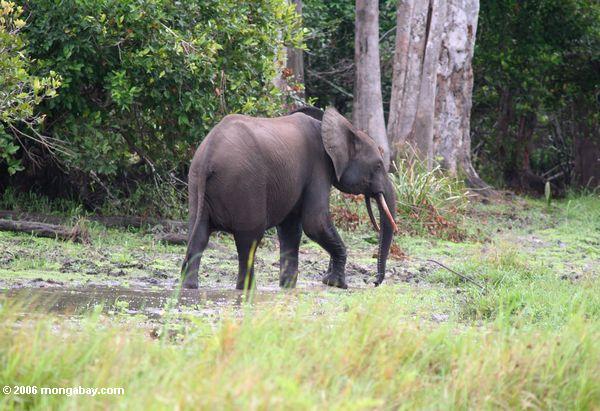
Elepahnts in Botswana. Photo by: Tiffany Roufs.
Yesterday the president of Kenya, Mwai Kibaki, sent a fiery signal to illegal wildlife traffickers worldwide. Kibaki lit up five tons of elephant ivory, worth $16 million on the black market, to show the continent’s resolve to undercut illegal poaching. This was the second time Kenya has set fire to millions of dollars worth of ivory.
“We cannot afford to sit back and allow criminal networks to destroy our common future,” Kibaki said. “Through the burning of contraband ivory, therefore, we are sending a clear message to poachers and illegal traders in wildlife about our collective resolve to fight this crime in our region and beyond.”
Confiscated in Sinapore in 2002, DNA tests showed that the 335 tusks burnt came from Malawi and Tanzania. The stockpile consisted of over 600 killed African elephants (Loxodonta africana).
Paula Kahumbu, executive director of WildlifeDirect a wildlife NGO in Kenya, attended the event and wrote in her blog that this was the “strongest conservation statement that has come out of Africa in a very long time.” Although a powerful statement, Kahumbu notes that Kenya still retains around 60 tons of confiscated elephant ivory, some of which is under heavy guard in Nairobi.
Elephant poaching has come back with a vengeance over the past decade. Elephant ivory was banned by the Convention on International Trade in Endangered Species (CITES) in 1989 which led to a short reprieve from poaching, however demand for ivory from Asia has made elephant poaching a major problem in many parts of Africa.
“We hope the burning of this ivory will serve as a beacon to other nations holding ivory stockpiles and encourage them to follow this example and destroy the huge amounts of poached ivory they have seized,” the executive director of the Environmental Investigation Agency (EIA), Mary Rice, said in a press release. “With avaricious consumer markets for ivory such as that in China, where up to 90 per cent of the ivory on the market place is of illegal origin, there is no such thing as a safe or harmless legal trade in ivory; this serves only to confuse consumers, stimulate fresh demand and allow the easy laundering of black market ivory.”
“The fire is the right place for it,” she adds.
African elephants are currently listed as Vulnerable by the IUCN Red List. However, scientists have recently suggested that there are two species of elephant in Africa. The more common savanna elephant (Loxodonta africana) and the forest elephant (Loxodonta cyclotis), which inhabits the Congo rainforest. This elephant is smaller than its savanna cousin and sports straighter tusks. It is also likely more endangered due to poaching.
Forest elephant in Gabon. Photo by: Rhett A. Butler.
Related articles
Elephants: the gardeners of Asia’s and Africa’s forests

(04/25/2011) It seems difficult to imagine elephants delicately tending a garden, but these pachyderms may well be the world’s weightiest horticulturalist. Elephants both in Asia and Africa eat abundant amounts of fruit when available; seeds pass through their guts, and after expelled—sometimes tens of miles down the trail—sprouts a new plant if conditions are right. This process is known by ecologists as ‘seed dispersal’, and scientists have long studied the ‘gardening’ capacities of monkeys, birds, bats, and rodents. Recently, however, researchers have begun to document the seed dispersal capacity of the world’s largest land animal, the elephant, proving that this species may be among the world’s most important tropical gardeners.
CEO sentenced for smuggling elephant ivory into US
(03/14/2011) A judge sentenced Pascal Vieillard, CEO of A-440 Pianos Inc., to 3 years probation for illegally smuggling elephant ivory into the US, while the Georgia-based company has been fined $17,500. Vieillard had earlier pleaded guilty to importing pianos with ivory parts.
95% of Liberia’s elephants killed by poachers
(01/24/2011) Since the 1980s, Liberia has lost 19,000 elephants to illegal poaching, according to Patrick Omondi of the Kenya Wildlife Service speaking in Monrovia, the capital of Liberia. The poaching of Liberia’s elephants has cut the population by 95% leaving only 1,000 elephants remaining.
